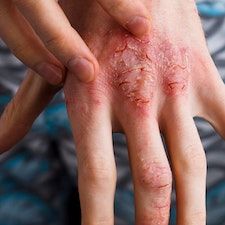Article
Positive Results for Ivarmacitinib in Treating Patients with Atopic Dermatitis
Author(s):
In recently-presented data, ivarmacitinib was found to have decreased severity of moderate-to-severe eczema compared to placebo.

Treatment with ivarmacitinib (8 mg or 4 mg) was well-tolerated in patients aged 12 and over with moderate-to-severe atopic dermatitis (AD), leading to over half of either dosage to achieve 75% Eczema Area and Severity Index reduction (EASI75), according to new data.1
A once-daily dose of ivamarcitinib—an oral and highly-selective JAK1 inhibitor known to block the inflammatory pathway for AD—was evaluated in this study to determine its efficacy and its safety profile.
This data was presented by Yan Zhao, MD, at the American Academy of Dermatology (AAD) 2023 Annual Meeting in New Orleans, LA.
Zhao and colleagues conducted the phase 3 trial by randomly-assinging AD patients aged between 12 and 75 to be given a once-daily dose of oral ivarmacitinib at either 8 mg, 4 mg, or placebo for the course of 16 weeks.
The investigators’ primary endpoints for the study were the proportion of patients achieving an Investigator Global Assessment (IGA) response—which was defined as an IGA score of 0/1 and a ≥2-grade improvement—and the amount of patients achieving EASI 75 from baseline at 16 weeks.
They randomized 336 participants into 3 groups: those receiving once-daily ivarmacitinib at 4 mg (113), those receiving once-daily 8 mg (112), and those receiving placebo (111).
They also offered study participants who had completed the 16-week treatment course an additional 44-weeks of active drug extension treatment.
Overall, the investigators reported that a substantially higher proportion of patients in the groups receiving 8 mg and 4 mg reported an IGA response (42.0% and 36.3%, respectively) compared to 9% in the placebo group.
They also noted that a substantially higher proportion of patients in the 8 mg and 4 mg ivarmacitinib groups achieved EASI 75 (66.1% and 54.0%, respectively) versus those in the placebo group at 21.6%.
In both treatment groups, a ≥4-point improvement from baseline in WI-NRS was also observed (40.2% and 37.2%, respectively) compared to the placebo group (12.6%).
The investigators also noted that 8 serious adverse events were reported, specifically 2 for the 8 mg group, 3 for the 4 mg group, and 3 for the placebo group.
Three of these serious adverse events related to infections such as sepsis, varicella, and COVID-19 pneumonia.
They added that no adverse events in the study led to major adverse cardiovascular events, death, or thromboembolic events.
References
- Zhao Y, et al. Ivarmacitinib, a highly selective JAK1 inhibitor for Moderate-to-Severe Atopic Dermatitis (AD): 16-week results from a Phase 3 pivotal study. Paper presented at: American Academy of Dermatology 2023 Annual Meeting; March 17 – 21. New Orleans, LA. Accessed March 20, 2023.





